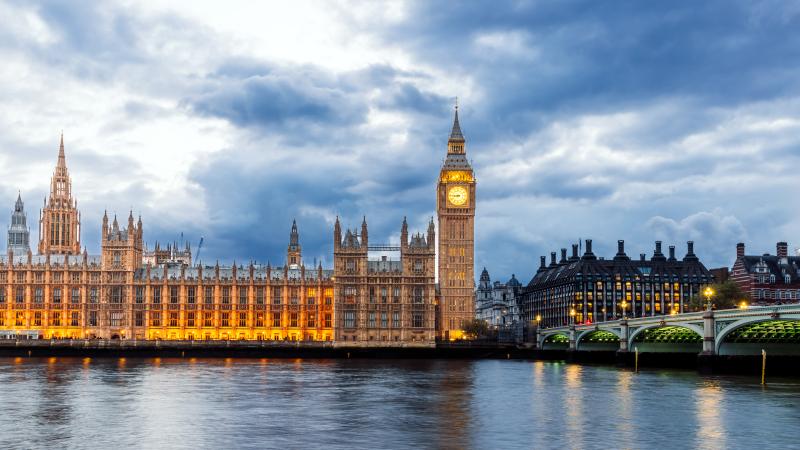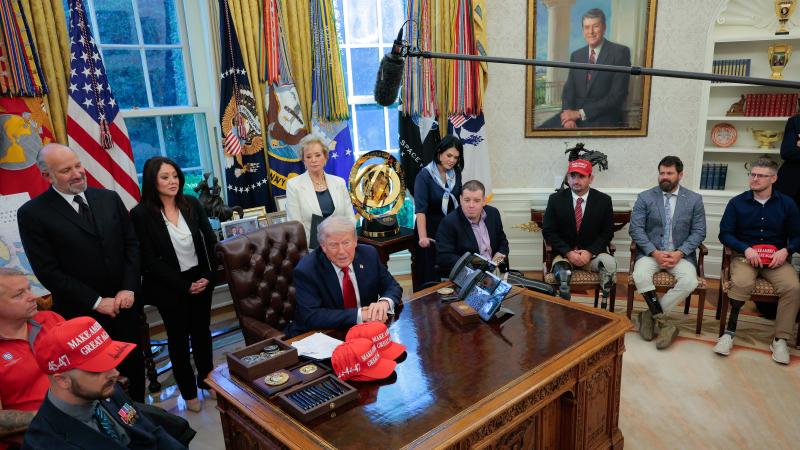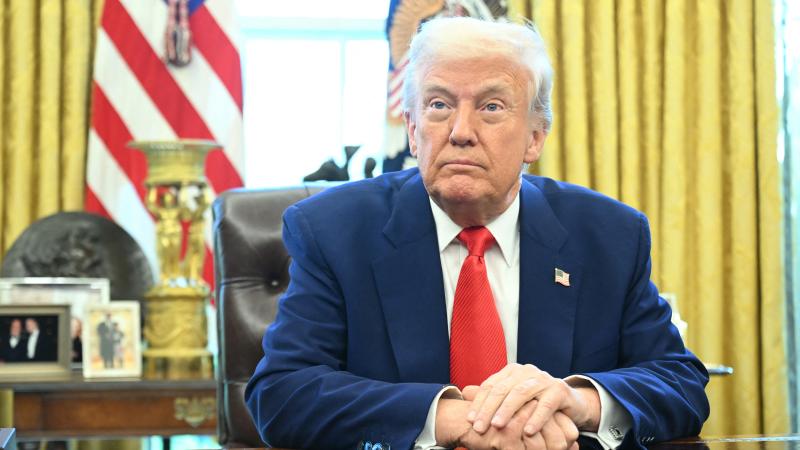From the Panama Canal to TikTok, China wants to keep its bargaining chips
China appears poised to use Panama Canal ports and TikTok as bargaining chips in Trump’s tariff war.
From ports strategically located at the entrance to the Panama Canal to the wildly successful TikTok algorithm, China is loath to give up advantageous bargaining chips it can use in the Trump administration’s tariff war.
The Chinese government is resisting dual efforts by the United States to target strategically situated ports at either end of the Panama Canal and targeting the inner workings of TikTok. In both cases, President Donald Trump has attempted to facilitate deals to transfer the assets to majority U.S. control, citing the vital importance of the Panama Canal to American security and seeking to comply with a law signed by his predecessor mandating the sale of TikTok over national security and privacy concerns.
While two strategically located port facilities and a popular social media app would appear unrelated, they serve as powerful negotiating tools for Beijing—the ports are strategically located near a vital sea lane for the United States and TikTok’s algorithm positions its Chinese parent company in an influential position over over U.S. public opinion.
These pressure points will only become more valuable as China seeks to extricate itself from the high tariff rates the Trump administration has imposed on bilateral trade since taking office. On Wednesday, Trump announced a new 34% “reciprocal tariff” on China—based on a calculation of the U.S. trade deficit with Beijing rather than a truly reciprocal measure of China’s tariffs—on top of the 20% tariff already imposed on the country. Financial markets tumbled on Friday morning after news that China would impose a 34% retaliatory tariff on the United States.
These tariffs could spell doom to China’s struggling economy considering nearly 15% of Beijing’s total exports are destined for the United States. In light of this, Chinese President Xi Jinping appears poised to block efforts that would sell off valuable advantages in future negotiations with the Trump administration.
The Panama Canal ports
Before taking office, President Trump zeroed in on China’s growing influence in Panama and increasing influence in the canal area through Chinese companies that own ports on either side of the canal and which planned to build a bridge over the waterway. Shortly after the inauguration, Trump dispatched Secretary of State Marco Rubio to pressure Panama to push China out of the vital waterway.
CK Hutchison, a Hong Kong-based company that owns ports on either side of the canal, announced plans to sell the facilities and dozens of ports around the world to a group led by U.S.-based private investment firm BlackRock after the American pressure. But, the port deal alarmed Beijing, which planned to use the ports as a bargaining chip in negotiations with the Trump administration, the Wall Street Journal reported.
China has so far successfully stalled the deal to stop that advantage from slipping out of its grasp. BlackRock originally wanted the deal finalized by April 2, however, China’s antitrust regulatory agency launched a probe into the proposed $23 billion sale by CK Hutchison, likely halting the deal in its tracks, if only temporarily.
China’s state media has also piled on to rile up opposition to the deal by pressuring CK Hutchison. Beijing-friendly Hong Kong media escalated its attacks on the proposed deal, which it argued in two commentaries undermines China’s national interests. These arguments were boosted by other Chinese state media, including the Global Times.
“If business decisions are made only for personal gain and ignore national interests, then no matter how well calculated or how much profit is made, it is self-evident which is more important than being despised by the Chinese people and being branded as a ‘traitor,’” one of the articles reads, a veiled threat to the company. Since 2015, the CCP has criminalized the spread of "false information" that the government deems a "threat to public order," and is punishable by up to seven years in prison.
The TikTok deal deadline extended
Attempts by the Trump administration to secure a sale of TikTok have also faced headwinds as the deadline under federal law—already extended once by the Trump administration—still looms.
Several bids have poured in ahead of the first extension deadline, which was set to expire on April 5, including offers from Wyoming-based billionaire Reid Rasner, Amazon, AppLovin, and adult website OnlyFans founder Tim Stokely, among others. One proposal would see software company Oracle lead an entity that would lease TikTok’s algorithm from ByteDance and routinely inspect the code to ensure the company does not manipulate the algorithm or funnel U.S. data to China.
Trump now says he wants to extend the deadline for a second time, indicating that the new tariffs his administration imposed on China could be a negotiating tool in securing a TikTok deal. He said on Friday that he would sign another executive order to extend the deadline by 75 days. However, the law passed last year mandating the sale of the app only allows the president to implement “a 1-time extension of not more than 90 days.”
Beijing is reluctant to see the algorithm permanently fall into American hands. In 2020, Beijing listed the algorithm on a restricted technologies export list, which designates certain technologies as vital to national security and requires a review before any export or sale could take place.
“The Chinese Communist Party won't give up its control of the TikTok algorithm because it's one of Beijing's most potent weapons against Americans,” Michael Sobolik, a Senior Fellow at the Hudson Institute who specializes in U.S.-China relations, told Just the News. “Any deal that leaves the algorithm in Beijing's hands would be illegal and unsafe.”
A study completed earlier this year found TikTok suppresses anti-China content and influences user opinion on the communist country’s human rights record and society, likely by manipulating its algorithm. This makes the app a potent tool for Beijing to influence public opinion in the United States.
Reports indicate that TikTok is also much closer to its Chinese parent company, and by extension Beijing, than it has continuously claimed, leaving data on Americans vulnerable. Several former employees of TikTok based in the United States, for example, last year claimed the company cooperated closely with its Chinese parent ByteDance and that public claims of independence were not entirely accurate, Fortune reported.
One former employee, Evan Turner, claimed he sent spreadsheets to ByteDance in China full of private data about hundreds of thousands of U.S.-based users of the TikTok app, including names, email addresses, IP addresses, location and demographic information for the purpose of improving algorithms but where it would be vulnerable to the Chinese government.
President Trump originally spearheaded efforts to ban the app in his first term. Congress passed legislation targeting TikTok last year, citing security and privacy concerns related to the application, its Chinese ownership, and algorithm. The law requires ByteDance to sell off TikTok or face a ban in the United States, where it has become a popular social media app. ByteDance challenged the law, but the Supreme Court unanimously upheld the law. After his election, Trump pivoted to trying to save the platform in a way that would allow it to remain operational in the U.S., which by law requires severing the platform from Chinese control.
Trump's extension of the deadline to April 5 has provided time for multiple bids for the app that would leave the China-based ByteDance with varying levels of control, however, none of those proposals have, so far, been successful.
The Facts Inside Our Reporter's Notebook
Links
- a new 34% âreciprocal tariffâ on China
- 15% of Beijingâs total exports
- planned to use the ports as a bargaining chip
- launched a probe
- escalated its attacks
- boosted by other Chinese state media
- punishable by up to seven years in prison
- bids have poured in
- Reid Rasner
- software company Oracle lead an entity
- extend the deadline for a second time
- only allows the president to implement
- listed the algorithm
- Senior Fellow at the Hudson Institute
- Fortune reported
- claimed he sent spreadsheets
- the Supreme Court unanimously upheld the law
















